
Top 5 Tools for Sentiment Analysis in Retail
Turn customer complaints and praise into clear action steps with tools that actually work for retail businesses.

Written by
Adam Stewart
Key Points
- Compare pricing upfront - only one tool shows costs before demos
- Check integrations early - setup complexity varies wildly between tools
- Use real-time alerts to catch sentiment changes as they happen
- Match tools to your data: social media monitoring vs product review analysis
Sentiment analysis tools help retailers process customer feedback from reviews, social media, and surveys to make informed business decisions. These tools enable businesses to identify emotions, monitor trends in real time, and integrate insights into existing systems like CRM or e-commerce platforms. Below are five leading tools tailored for retail needs:
- Brandwatch Cortex: AI-driven analysis with multilingual support, real-time monitoring, and flexible integration options.
- Chattermill: Focuses on customer feedback management with predictive analytics and a centralized dashboard.
- Lexalytics: Offers powerful text analysis solutions, including cloud and on-premise options, designed for enterprise use.
- Revuze: Specializes in product-focused sentiment insights with scalable data processing and global reach.
- Contentsquare: Combines sentiment analysis with digital experience metrics to optimize online customer interactions.
Each tool provides custom pricing and integration capabilities, ensuring they can align with different business sizes and requirements.
Quick Comparison
| Tool | Starting Price | Key Features | Best For | Integration Options |
|---|---|---|---|---|
| Brandwatch Cortex | Custom pricing | Social listening, AI-driven insights | Social media monitoring | CRM, e-commerce platforms |
| Chattermill | Custom pricing | Unified dashboard, predictive analytics | Customer experience management | Survey platforms, review sites |
| Lexalytics | Custom pricing | Multilingual, text analytics engine | Enterprise-level analysis | APIs, cloud/on-premise options |
| Revuze | $30,000/year | Product sentiment, trend tracking | Product and market research | E-commerce platforms |
| Contentsquare | Custom pricing | Digital experience analytics | Website performance optimization | Analytics and marketing tools |
These tools offer scalable solutions to analyze customer sentiment and improve retail strategies. Choose based on your business goals, existing tech stack, and focus areas like social media, e-commerce, or product insights.
1. Brandwatch Cortex
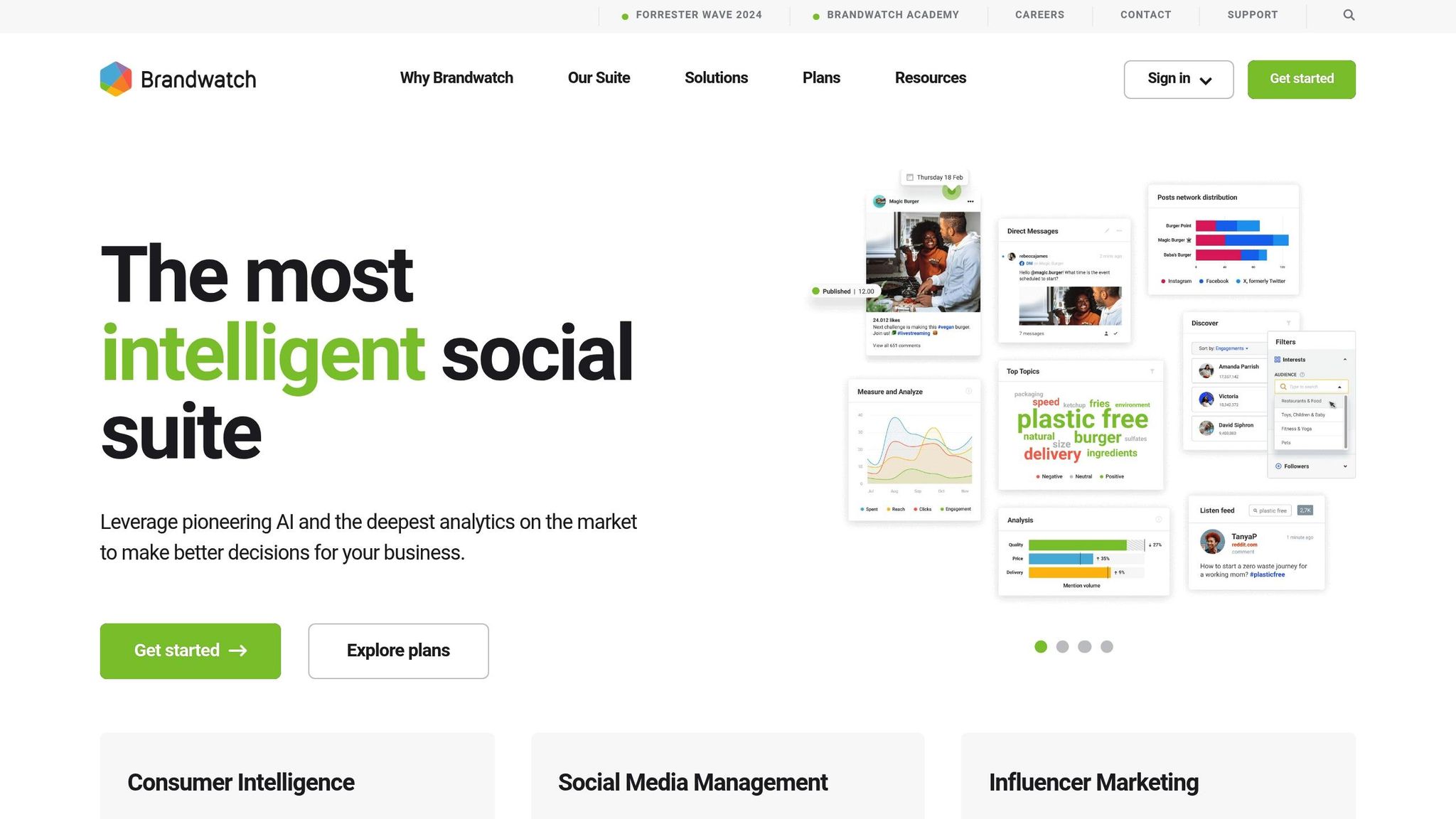
Brandwatch Cortex is a tool designed to help retail businesses make sense of customer feedback through sentiment analysis. By combining AI with human expertise, it processes data from social media, reviews, and other customer interactions. Here's a closer look at what Cortex offers for retail sentiment analysis.
Multilingual Support and Real-Time Monitoring
Cortex caters to retailers with diverse audiences by supporting multiple languages. It also tracks sentiment in real time, allowing businesses to respond quickly to customer feedback as it happens.
Integration with Retail and E-commerce Systems
Thanks to its flexible API, Cortex can connect seamlessly with retail and e-commerce platforms, making it easier to incorporate into existing workflows.
Advanced Sentiment Analysis
Cortex uses a mix of machine learning and human review to provide more precise sentiment insights. This approach ensures it captures the nuances in customer feedback, reducing the chances of misinterpreting reviews or comments.
Flexible Pricing and Scalability
Cortex is designed to grow with your business. Its scalable pricing and infrastructure can handle spikes in data volume, making it a practical choice for both small retailers and large enterprises.
2. Chattermill
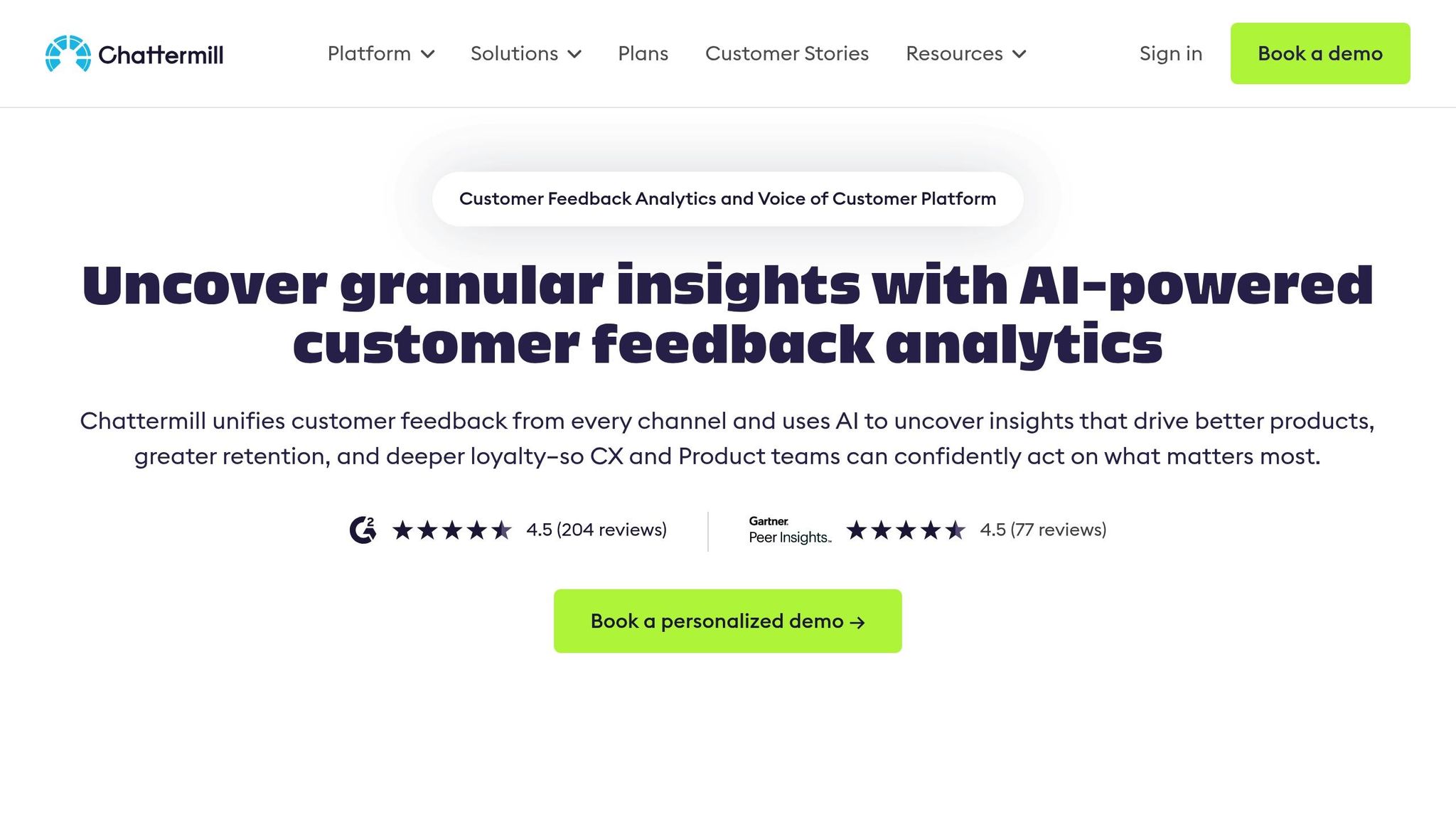
Integration with Retail and E-commerce Platforms
Chattermill stands out with its ability to connect effortlessly to major retail and e-commerce platforms. This integration streamlines the process of gathering customer feedback, bringing all insights into one centralized system for easier management and analysis.
3. Lexalytics
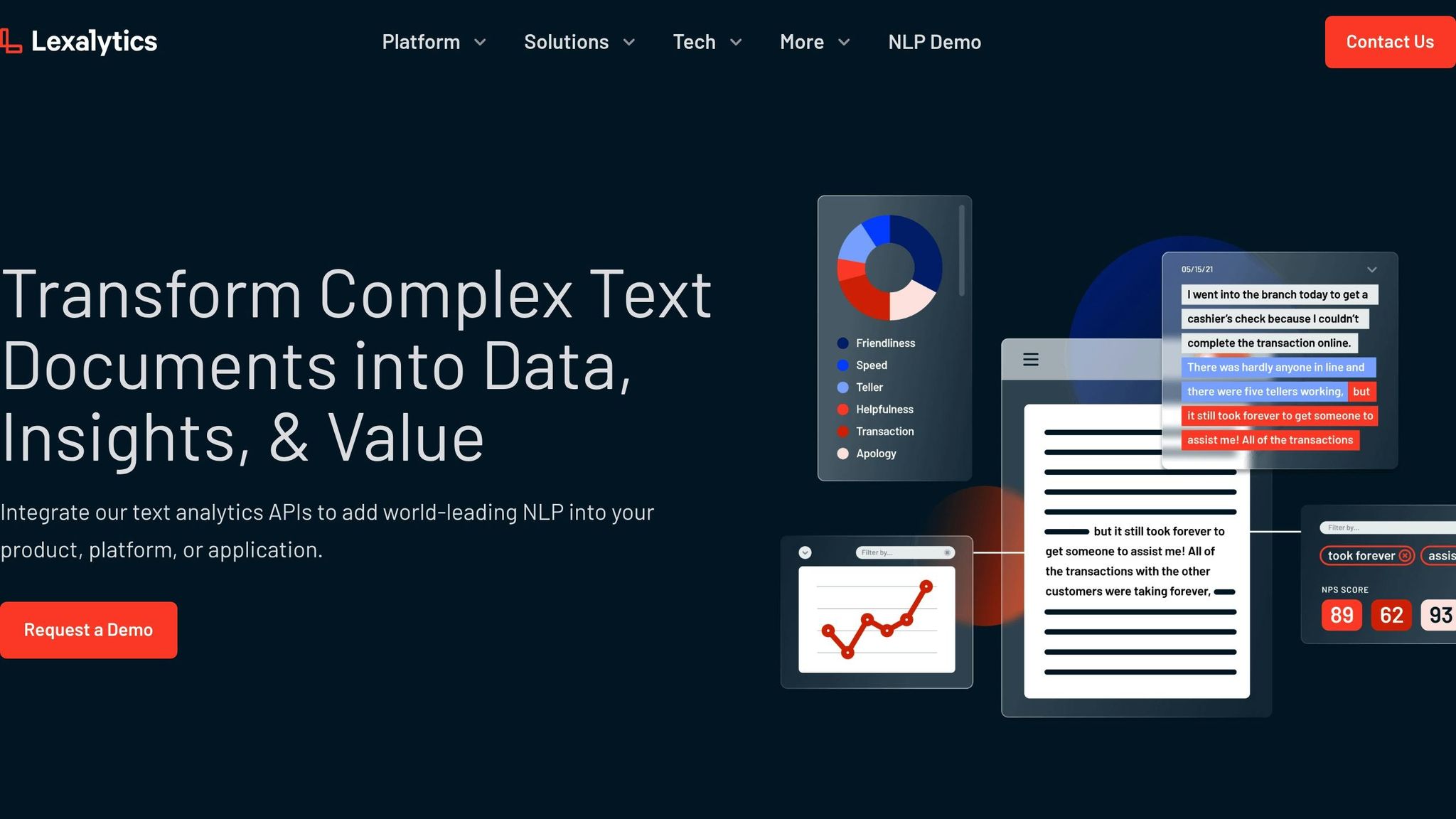
Lexalytics offers a range of text analytics tools designed specifically for the retail industry. Their solutions come in three options: Salience (on-premise), Semantria (cloud-based), and Spotlight (a comprehensive text management and analysis platform).
Integration with Retail and E-commerce Platforms
Lexalytics makes it easy for retailers to connect their tools with popular e-commerce platforms and CRM systems using pre-built connectors. For businesses using older systems, custom API bridges can be developed, though this may extend the setup time. Semantria’s RESTful API supports smooth cloud-based integration, while Salience provides libraries for those who prefer a fully on-premise solution.
Accuracy and Data Processing Capabilities
Powered by a strong natural language processing (NLP) engine, Lexalytics excels at analyzing unstructured text. It’s designed to understand context and handle retail-specific terminology effectively.
Pricing and Scalability for Retailers
For retailers, implementation time depends on the system setup. With pre-built connectors, it can take as little as 4 days, while integrating with complex legacy systems may take 8–12 weeks. Spotlight enhances usability by allowing flexible data exports in formats like .csv and .json, making it easy to integrate with business intelligence tools.
4. Revuze
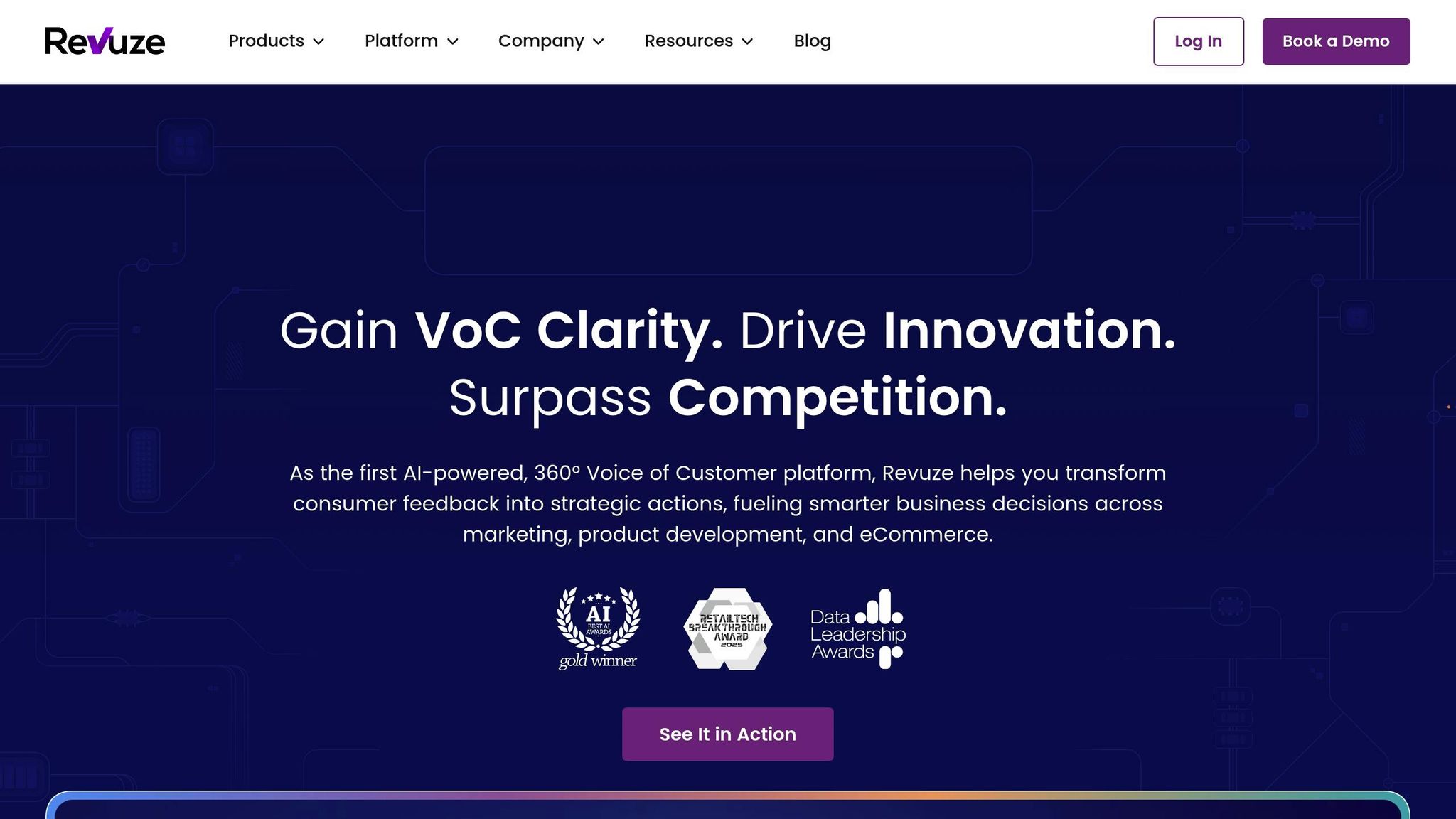
Revuze is an AI-powered platform designed to analyze consumer sentiment, making it a valuable tool for market research in the consumer product industry. By processing vast amounts of feedback, it uncovers sentiment trends across various product categories.
Real-Time Insights
Revuze's Analysis Pillar employs thousands of fine-tuned models to deliver consistent and precise sentiment analysis on a global scale.
Scalable Data Processing
With the ability to handle massive volumes of reviews, Revuze ensures accurate trend tracking and sentiment analysis, even when managing large datasets.
Flexible Pricing for Retailers
Revuze is built to accommodate businesses of all sizes, offering pricing that starts at $30,000 per year. The Basic plan is also available at this rate. For those looking to explore the platform, a free trial and a free version are offered. Retailers can even request customized pricing to suit their needs, making Revuze a practical choice for both small businesses and large enterprises.
sbb-itb-ef0082b
5. Contentsquare
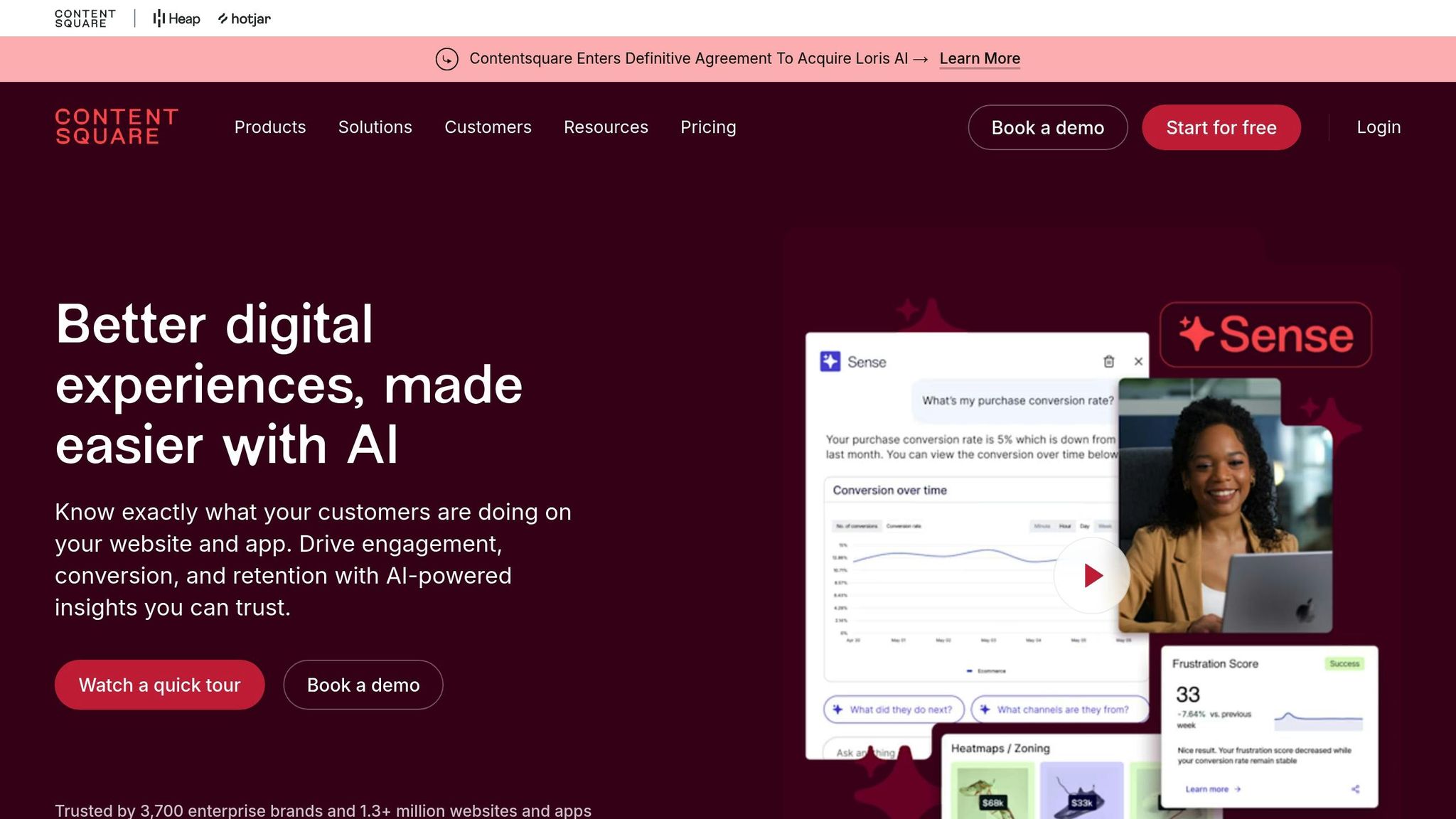
Contentsquare is a platform that focuses on digital experience analytics, offering specialized sentiment analysis to uncover how customers behave across online channels.
Integration with Retail and E-commerce Platforms
Contentsquare integrates smoothly with major e-commerce platforms. By adding a simple code snippet, businesses can collect user data across multiple touchpoints, creating a comprehensive view of customer interactions.
Real-Time Insights and Analytics
The platform processes data in real-time, delivering instant insights into customer emotions. This allows retailers to quickly identify and address pain points during browsing or checkout. It combines sentiment analysis with broader digital experience metrics to provide a well-rounded picture.
Accuracy of Sentiment Analysis
Using advanced machine learning, Contentsquare deciphers how users navigate and interact with websites, offering detailed sentiment insights that align closely with business goals.
Pricing and Scalability for Retailers
With tiered pricing options and a scalable structure, Contentsquare supports businesses of all sizes, handling varying traffic levels and accommodating international growth.
Tool Comparison Chart
This chart outlines the key features, pricing, and integration options of several tools, helping you identify which aligns best with your retail strategy.
| Tool | Starting Price | Key Features | Best For | Integration Options |
|---|---|---|---|---|
| Brandwatch Cortex | Custom pricing | Social listening, AI-driven insights, brand monitoring, crisis detection | Large retailers with a strong social media focus | Major social platforms, CRM systems, business intelligence tools |
| Chattermill | Custom pricing | Customer feedback analysis, unified dashboard, predictive analytics | E-commerce businesses prioritizing customer experience | Help desk software, survey platforms, review sites |
| Lexalytics | Custom pricing | Text analytics engine, multilingual support, on-premise deployment | Enterprise retailers needing tailor-made solutions | APIs for custom integration, cloud and on-premise options |
| Revuze | Custom pricing | Product-focused sentiment, competitive analysis, consumer insights | Product managers and merchandising teams | E-commerce platforms, product management tools |
| Contentsquare | Custom pricing | Digital experience analytics, real-time insights, behavioral data | Online retailers aiming to optimize website performance | E-commerce platforms, analytics tools, marketing automation |
Each tool offers custom pricing, typically based on factors like data volume, team size, and specific feature needs. This approach allows retailers to scale their investment as they grow, ensuring flexibility and value.
When choosing a solution, consider your budget alongside the potential return on investment. These tools, though premium, often deliver strong results by enhancing customer satisfaction and streamlining operations. For example, Brandwatch is ideal for social media monitoring, while Contentsquare specializes in analyzing website behavior.
All tools support API connections to integrate with most retail platforms. However, the ease of integration and scalability will depend on your existing technology stack and plans for expansion.
This comparison lays the groundwork for selecting the best tool to meet your business goals.
Final Thoughts
Sentiment analysis tools have become essential for staying ahead in today’s competitive retail market. The platforms we've discussed each bring their own strengths, offering new ways to understand and act on customer feedback.
With a centralized dashboard, you can uncover trends from surveys, support tickets, and social media. This makes it easier to spot potential issues before they grow into larger problems and recognize patterns that might otherwise slip through the cracks. The real advantage lies in the ability to process feedback quickly and accurately across multiple channels.
These tools don’t just interpret customer emotions - they integrate directly into your existing workflows. With real-time analytics and seamless integration, they enable retailers to respond to customer sentiments as they evolve. This ensures insights can be acted on immediately, helping you address concerns or seize opportunities as they arise.
By using features like real-time dashboards, alerts, and predictive analytics, you can tackle customer concerns right away and even anticipate future needs. However, keep in mind that sentiment accuracy typically falls within the 60–75% range. For the most reliable outcomes, pair these tools with human expertise.
Ultimately, the best platform for your business will depend on factors like your company size, budget, and preferred customer engagement channels. Whether you're a large retailer focusing on social media or an e-commerce business aiming to enhance customer experiences, the right sentiment analysis tool can strengthen customer relationships and support long-term growth.
FAQs
How can sentiment analysis tools work with retail systems like CRMs and e-commerce platforms?
Sentiment analysis tools often connect with retail systems like CRMs and e-commerce platforms using APIs or automation tools. These connections ensure sentiment data integrates smoothly into your current workflows. For instance, customer sentiment insights can be embedded directly into profiles, dashboards, or support systems, making it easier to deliver personalized experiences and analyze feedback in real time.
By weaving sentiment data into these systems, retailers can gain a clearer picture of customer emotions, enhance engagement efforts, and make smarter, data-backed decisions across sales, marketing, and customer service.
What should retailers consider when selecting a sentiment analysis tool?
When choosing a sentiment analysis tool, it's essential for retailers to weigh several critical factors to ensure it aligns with their business needs. Start by evaluating data volume - can the tool handle the scale of your customer feedback? Next, check language support, especially if you're working with a diverse customer base. And don't overlook privacy requirements, as safeguarding customer data is non-negotiable.
You'll also want to dig into the tool's ability to interpret emotional trends, grasp context, and deliver detailed insights into specific areas of customer feedback. These capabilities can make a big difference in understanding what your customers are truly saying.
Beyond that, think about how smoothly the tool integrates with your current systems, the level of technical know-how it demands, and whether it fits within your budget. A tool that aligns with your customer engagement goals and operational needs can empower better decisions and elevate the overall customer experience.
How accurate are sentiment analysis tools at understanding customer emotions, and what can businesses do to make these insights more reliable?
Sentiment analysis tools typically achieve an accuracy rate of 80-85% when interpreting customer emotions, which aligns closely with how often humans agree on sentiment. That said, the accuracy of these tools can fluctuate depending on the quality of the data and the context being analyzed.
To make sentiment insights more dependable, businesses should prioritize using clean, relevant data and pre-process text to eliminate unnecessary noise. It's also crucial to select algorithms capable of understanding complexities like sarcasm or ambiguous language. Additionally, regularly updating models and training them with industry-specific terminology can sharpen their accuracy. By addressing these aspects, businesses can extract more reliable and actionable insights into customer emotions.
Summarize with AI
Related Posts
10 Best Sentiment Analysis Tools for Telecom 2024
Explore the top 10 sentiment analysis tools for telecom in 2024. Learn how to choose the right tool for customer service, brand reputation, and market insights.
Real Estate Review Sentiment Analysis Methods: Complete Guide 2025
Discover how AI sentiment analysis transforms real estate with insights into market trends, customer feedback, and investment opportunities. Stay ahead in the competitive market.
7 Best Practices for AI Customer Feedback Analysis
Learn the 7 best practices for AI customer feedback analysis, including setting up clear channels, using NLP for sentiment analysis, and connecting feedback analysis with other systems.
AI Sentiment Analysis for CX: Guide & Best Practices
Discover the benefits and best practices of AI sentiment analysis for enhancing customer experience. Learn how to implement and improve sentiment analysis with AI technology.
